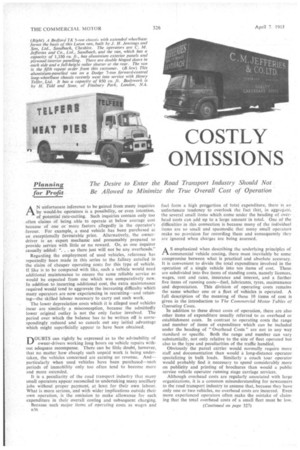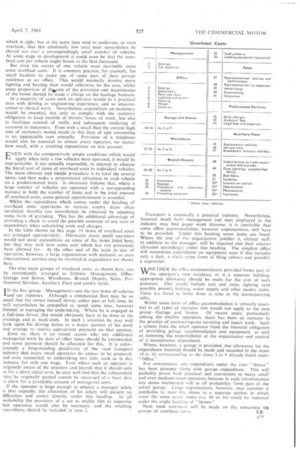COSTLY OMISSIONS
Page 110

Page 113

If you've noticed an error in this article please click here to report it so we can fix it.
Planning The Desire to Enter the Road Transport Industry Should Not for Profit Be Allowed to Minimize the True Overall Cost of Operation'.
N unfortunate inference to be pined from many inquiries by would-be operators is a possibility, or even intention, of potential rate-cutting. Such inquiries contain only too often claims of being able to operate at below average cost because of one or more factors allegedly in the operator's favour. For example, a used vehicle has been purchased at an exceptionally favourable price. Alternatively, the ownerdriver is an expert mechanic and presumably prepared to provide service with little or no reward. Or, as one inquirer casually added: ". • . so there just will not be any overheads."
Regarding the employment of used vehicles, reference has repeatedly been made in this series to the fallacy entailed in the claim of cheaper operating costs for this type of vehicle. If like is to be compared with like, such a vehicle would need additional maintenance to ensure the same reliable service as would be expected from one which was comparatively new. En addition to incurring additional cost, the extra maintenance required would tend to aggravate the increasing difficulty which many operators are now experiencing in recruiting—and retaining—the skilled labour necessary to carry out such work.
The lower depreciation costs which it is alleged used vehicles incur are similarly a misconception, because the admittedly lower original outlay is not the only factor involved. The period over which the balance has to be written off is correspondingly reduced and so cancels out any initial advantage which might superficially appear to have been obtained.
DOUBTS can rightly be expressed as to the advisability of owner-drivers working long hours on vehicle repairs without adequate recompense. There can be little doubt, however, that no matter how cheaply such unpaid work is being undertaken, the vehicles concerned are earning no revenue. And— particularly when used vehicles have been purchased—such periods of immobility only too often tend to become more and more extended.
It is a peculiarity of the road transport industry that many small operators appear reconciled to undertaking many ancillary jobs without proper payment, at least for their own labour. What is more serious, and with wider implications outside their own operation, is the omission to make allowance for such expenditure in their overall costing and subsequent charging.
Because such major items of operating costs as wages and n36 fuel form a high prouortion of total expenditure, there is an unfortunate tendency to overlook the fact that, in aggregate, the several small items which come under the heading of overhead costs can add up to a large amount in total. One of the difficulties in this connection is because many of the individual items are so small and spasmodic that many, small operators make no provision for recording them and consequently they arc ignored when charges are being assessed.
S emphasized when describing the underlying principles of ti commercial vehicle costing, there must inevitably be some compromise between what is practical and absolute accuracy. It is convenient to divide the total expenditure involved in the operation of a single vehicle into ten items of cost. These are subdivided into five items of standing costs, namely licences, wages, rent and rates, insurance and interest, and a further five items of running costs—fuel, lubricants, tyres, maintenance and depreciation. This division of operating costs remains the same whether one or a fleet of vehicles is operated. A full description of the meaning of these 10 items of cost is given in the introduction to The Commercial Motor Tables of Operating Costs.
In addition to these direct costs of operation, there are also other items of expenditure usually referred to as overhead or establishment costs. In contrast to operating costs the range and number of items of expenditure which can be included under the heading of "Overhead Costs" are not in any way standard or specific. Both the range and number can vary substantially, not only relative to the size of fleet operated but also to the type and peculiarities of the traffic handled.
Obviously the parcel carrier would normally require more staff and documentation than would a long-distance operator specializing in bulk loads. Similarly a coach tour operator would probably had it necessary to spend considerably more on publicity and printing of brochures than would a public service vehicle operator running stage carriage services.
Although overhead costs are regularly associated with large organizations, it is a common misunderstanding for newcomers to the road transport industry to assume that, because they have only one or two vehicles, no overhead costs are incurred. Even more experienced operators often make the mistake of claiming that the total overhead costs of a small fleet must be low. which is right, but at the same time tend to underrate, or even overlook, that this admittedly low total must nevertheless be shared out over a correspondingly small number of vehicles. At some stage in development it could even be that the overhead cost per vehicle might lessen as the fleet increased, But even the owner of one vehicle must inevitably incur some overhaul costs. It is common practice, for example, for small hauliers to make use of some part of their private residence as an office. This would normally involve more lighting and heating than would otherwise be the case, whilst some proportion of thucost of the provision and maintenance of the house should be made a charge on the haulage business.
In a majority of cases such an operator would be a practical man with driving or engineering experience, and so unaccustomed to clerical work. Nevertheless, expenditure on stationery would be essential, not only to comply with the statutory obligation to keep records of drivers' hours of work, but also to facilitate control of traffic and subsequent rendering of accounts to customers. Even with a small fleet the current high cost of stationery would result in this item of cost amounting to an appreciable sum annually. Provision of a telephone would also be essential to almost every operator, no matter how small, with a resulting expenditure on this account.
EVEN with the comparatively simple conditions which would apply when only a few vehicles were operated, it would be impracticable, if not actually impossible, to attempt to allocate the literal cost of items of overhead costs to individual vehicles. The more obvious and simple procedure is to total the several items, and then make a proportional allocation to each vehicle on a predetermined basis. It obviously follows that, where a large number of vehicles are operated with a corresponding increase in both the number of items and in the total amount of overhead costs, some general apportionment is essential.
Whilst the expenditure which comes under the heading of overhead costs appertains to various sundry items often unrelated, benefits can nevertheless be obtained by adopting some form of grouping. This has the additional advantage of providing a check to avoid the possibleomission of any item of expenditure when calculating costs and charges.
In the table shown on this page, 55 items of overhead costs are arranged appropriately. Obviously many small operators would not incur expenditure on some of the items listed here, but they may well note some cost which has not previously been allowed for. At the other end of the scale in size of operation, however, a large organization with national, or even international, services may be involved in expenditure not shown here.
The nine main groups of overhead costs, as shown here, can be conveniently arranged as follows: Management, Office. Garage and Stores, Warehouse, Branch Depots, Sales, Professional Services, Auxiliary Fleet and sundry items.
I N the first group—Management—are the two items of salaries -Land car expenses. Although a commercial fleet may be so small that the owner himself drives, either part or full time, he will nevertheless be compelled to spend some time, however limited, in managing the undertaking. Where he is engaged as a full-time driver, this would obviously have to be done in the evenings and at week-ends. In such a situation he may well look upon his driving duties as a major portion of his work and arrange to receive appropriate payment on that account.
Even so, there is no sound reason why any additional managerial work he does at other times should he unrewarded, and some payment should be allocated for this. It is unfortunately a long-standing peculiarity of the road transport industry that many small operators do appear to be prepared. and even reconciled, to undertaking two jobs, such as in this instance, for only one wage. Even where such an operator is 3riginally aware of the situation and intends that it should only 3e for a short initial term, he may well find that the substandard -ates he originally quoted cannot be increased at a later date 0 allow for a justifiable amount of managerial costs.
If the operator is large enough to employ a manager solely n that capacity, the allocation of his salary will present no lifficulties and comes directly under this heading. In all )robability the provision of a car to enable him to supervise leet operation would also be necessary, and the resulting .xpenditure should be included in item 2. Transport is essentially a practical industry. Nevertheless, however much both management and men employed in the industry may find paper work irksome, it is inevitable that some office accommodation, however unpretentious, will have to be provided. Under this heading seven items are listed. Where the size of the organization justifies it, clerical staff, in addition to the manager, will be required and their salaries allocated accordingly under this heading. The simplest office will necessitate expenditure on equipment even if this includes only a desk, a chair, some form of filing cabinet and possibly a typewriter.
WI-1ETHER the office accommodation provided forms part of the operator's own residence or is a separate building, appropriate allowance should be made for the cost of such premises. This would include rent and rates, lighting (and possibly power), heating, water supply and other sundry items. These are listed as items three to nine in the accompanying table.
Whilst some form of office accommodation is virtually essential to all types of operator this would not apply to the next group—Garage and Stores. Of recent years, particularly among the smaller operators, there has been an increase in the practice of contracting-out servicing and repair work. Such a system frees the small operator from the financial obligation of providing garage accommodation and equipment, as well as removing the responsibility of the organization and control of a maintenance department.
Where, however, a garage is provided, due allowance for the expenditure incurred should be made and recorded in the items 10 to 16, corresponding to the items 3 to 9 already listed under "Office."
For convenience, any expenditure under the item " Stores " has been grouped along with garage expenditure. This will probably prove both practical and convenient to many small and even medium-sized operators, because in such circumstances any stores maintained will in all probability form part of the actual garage, Larce organizations, however, may consider it justifiable to treat the stores as a separate section in which event the same seven items (i.e. 10 to 16) could be repealed under the single hcading of " Stores."
Next week comment will be made on the remaining six groups of overhead costs. S.B.




























































































































































